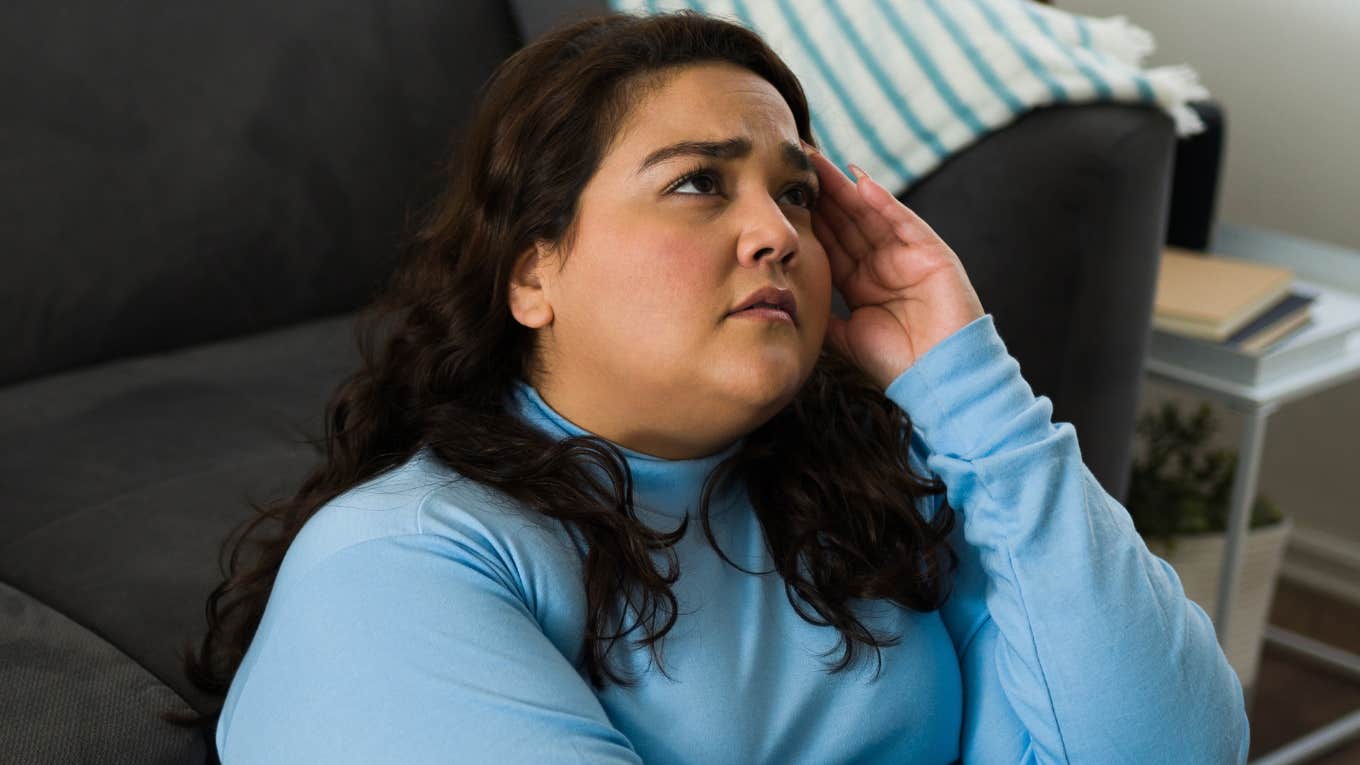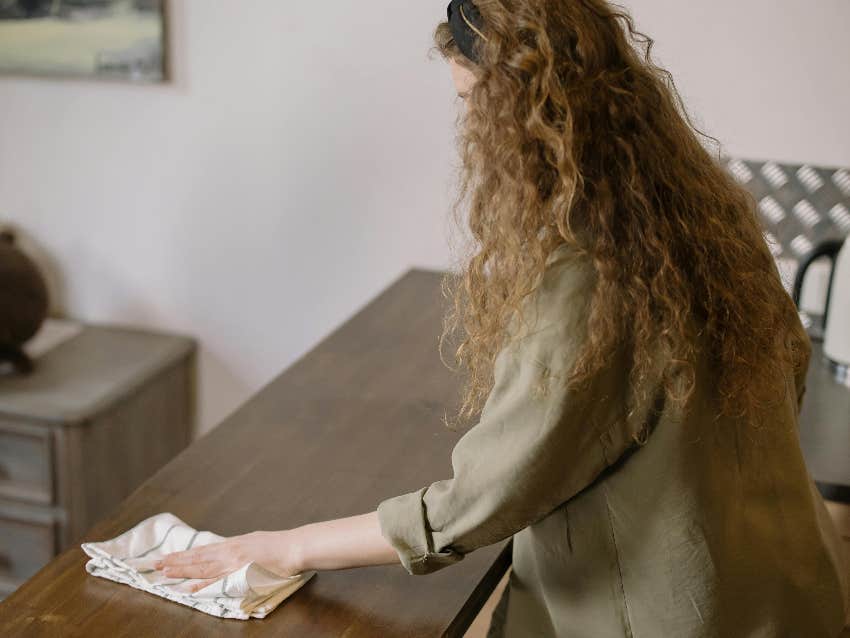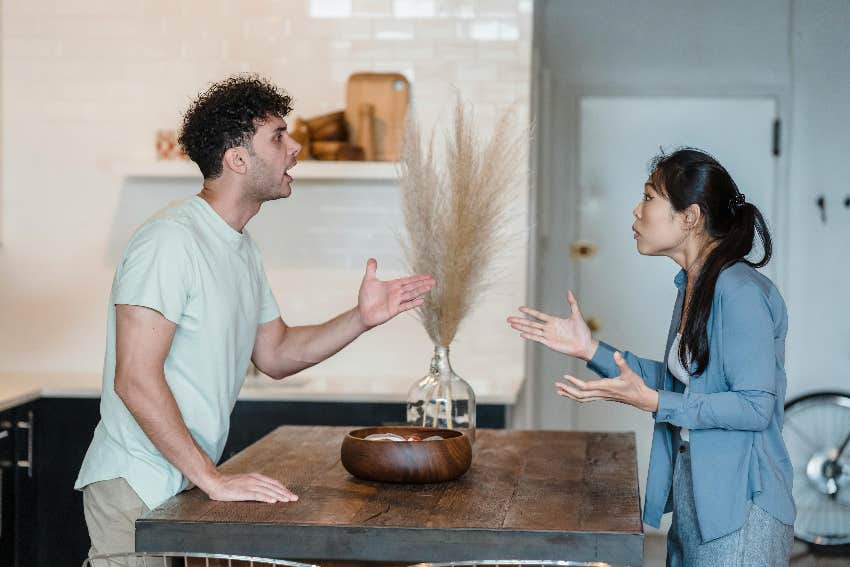If You Recognize These 10 Things In Your Relationship, Psychology Says Your Partner May Be Codependent
Are you enabling a codependent partner?
 Antonio_Diaz | Canva
Antonio_Diaz | Canva What is codependency? This behavior involves two people, usually in a relationship, enabling one another, whether that includes addiction, bad behavior, or irresponsibility. Two individuals rely on one another "for approval and a sense of identity."
I didn't think I was a codependent person until I was slammed into reality one night in a Barnes & Noble aisle. There I was, sprawled under the four shelves labeled "Addiction," desperately thumbing through each book with shiny streaks down my face. I knew I was in a codependent relationship at that moment — and enabling my codependent partner.
If you recognize these ten things in your relationship, your partner may be co-dependent:
1. You're dating or married to an alcoholic or addict (any kind of addict)
And/or you have a history of attracting damaged people into your life. You cannot be the sole supporter. It is not your sole purpose to get them sober, they need to want it to.
Relationship and motivational coach Jessica M. Miller offered empathy to those who love an addict. "Being married to an addict is very lonely. What would it be like if we extended compassion, rather than shame or judgment to those who stand by their addicted partner? Consider the why behind the choice to stay rather than hyper-focus on the reasons why we would never put up with that."
2. You do things for your partner that he or she can and should be doing, all in the name of love
 cottonbro studio / Pexels
cottonbro studio / Pexels
Maybe your mother or sister repeatedly tells you that you help this person a little too much. It's nice that you want to help, but they can do things too.
Codependent relationships rely on dynamics where one person in a relationship becomes excessively reliant on their partner's emotional well-being, often neglecting their own needs and exhibiting behaviors like people-pleasing and excessive caretaking, usually stemming from low self-esteem and a history of emotional dysregulation. A 2021 study published in the Scholars Journal of Applied Medical Services explained codependency can lead to anxiety, depression, stress, and difficulty maintaining healthy relationships.
3. You let your partner have his or her way
And then you feel overwhelmed with negative feelings of anger and resentment. "Look at all I do for you!" Is a common phrase in the codependent’s vocabulary.
4. You feel responsible for your partner's actions and behaviors
Because: love. No, they are their own person with their actions. Feeling responsible for a partner's actions, often referred to as co-dependency, can stem from various factors, including low self-esteem, attachment styles, childhood experiences, and a desire to control the relationship.
A 2020 study found that this can lead to unhealthy dynamics in which individuals take on excessive responsibility for their partner's emotions and behaviors, sometimes at the expense of their well-being. Recognizing when one is taking on too much responsibility and identifying the underlying reasons is crucial. Setting boundaries and expectations in a relationship is essential to prevent codependent behaviors.
5. You're always talking/worrying about your partner's issues
You make them your issues. They are not yours. Yes, you can tackle them as a team, but it should not just be you tackling them.
6. You've allowed irresponsible, hurtful behavior in your relationship
Not just physically, but emotionally or financially. Instead of walking away, your deep compassion for this person makes you want to stay and help. This is not good because it teaches them what you will tolerate.
"A codependent person has let another person's behavior affect him or her and is obsessed with controlling that person's behavior," explained life coach Amanda Wiegart. Rehabilitating from codependent behavior takes time but is worth the effort once you're able to recognize the signs.
7. Your partner's mood affects your day
 Timur Weber / Pexels
Timur Weber / Pexels
In both good and bad ways. Sure, you don't want your special person to be upset, but that shouldn't ruin your day.
8. You always want to know what your partner is doing or thinking
And you often get involved in his or her business. This is a waste of time and energy and is horrible for your mental health.
Certified empowerment coach Keith Dent offered advice on signs that you're the controlling partner in a relationship, one of them being never giving your partner alone time. "You sap their strength by demanding they spend all of their free time with you," Dent explained.
9. Your partner's needs always seem to be met, while your needs and wants are ignored
They are the focus of the relationship leaving you out to dry. Your partner's happiness is all that matters.
10. You have trouble pinpointing your feelings and thoughts, or you diminish/deny how you feel
This isn't healthy on all levels. One, you need to have individuality in relationships. Staying true to who you are helps you from getting lost in the relationship. And two, your feelings deserve to be known and validated.
And if any of this makes you say, "Oh my gosh! That's so my mother!" that's another sign of some deep codependent programming, as this is a learned dynamic. Codependents (and addicts, for that matter) are almost always children of codependents, passed down like a family legacy.
Emotional invalidation can significantly damage a relationship by causing dismissiveness, a lack of support, and, ultimately, decreased relationship satisfaction. It can occur through behaviors like minimizing one's feelings, dismissing one's concerns, or comparing one's experiences to seemingly lesser situations. A 2023 study found that while some partners may intentionally invalidate their feelings, it often occurs due to poor communication skills, lack of emotional awareness, or personal experiences.
Of course, the roots and symptoms of codependency are individual and nuanced. Some codependents have next to no boundaries around things like their health and happiness, while others have developed walls so tall and thick that no one can get in.
And some codependents are also dealing with addictions, known as "Double Winners," so their experience is different than mine. All in all, though, codependency is an emotional dysfunction that affects so many aspects of life.
Taking care of our needs — loving ourselves — isn't selfish or narcissistic, it's incredibly healthy. Expecting reciprocity and respect from our partners isn't unrealistic, it's love.
And allowing someone to hurt us, like an addicted husband, says more about our self-respect than it says about them because we've allowed it into our lives. Recovering from codependency has been like coming home to myself.
Recovering from codependency has meant maturing in all the ways I needed to mature. Recovering from codependency also saved my long-term marriage, proving that the only way to change other people is to change ourselves.
Here are some tips to help if you struggle with codependency:
- Set boundaries, and stick to them!
- Listen actively. Listen to your partner and vice versa.
- Make time for self-interests. Make time for yourself. Get a hobby or something you like to do.
Interdependence is not codependence. Healthy interdependence suggests that "partners recognize and value the importance of the emotional bond they share while maintaining a solid sense of self within the relationship dynamic."
Though it is often confused with codependency, it's not the same. A codependent person tends to "rely heavily on others for their sense of self and well-being. That person cannot distinguish where they end and their partner begins."
If you think you may be experiencing depression or anxiety as a result of ongoing emotional abuse, you are not alone. Domestic abuse can happen to anyone and is not a reflection of who you are or anything you've done wrong. If you feel as though you may be in danger, there is support available 24/7/365 through the National Domestic Violence Hotline by calling 1-800-799-7233. If you’re unable to speak safely, text LOVEIS to 1-866-331-9474.
Michelle Horton is a writer and advocate. Through the Nicole Addimando Community Defense Committee, she speaks out for her sister and the countless other victims of domestic violence criminalized for their acts of survival. She's the author of Dear Sister: A Memoir of Secrets, Survival, and Unbreakable Bonds.

